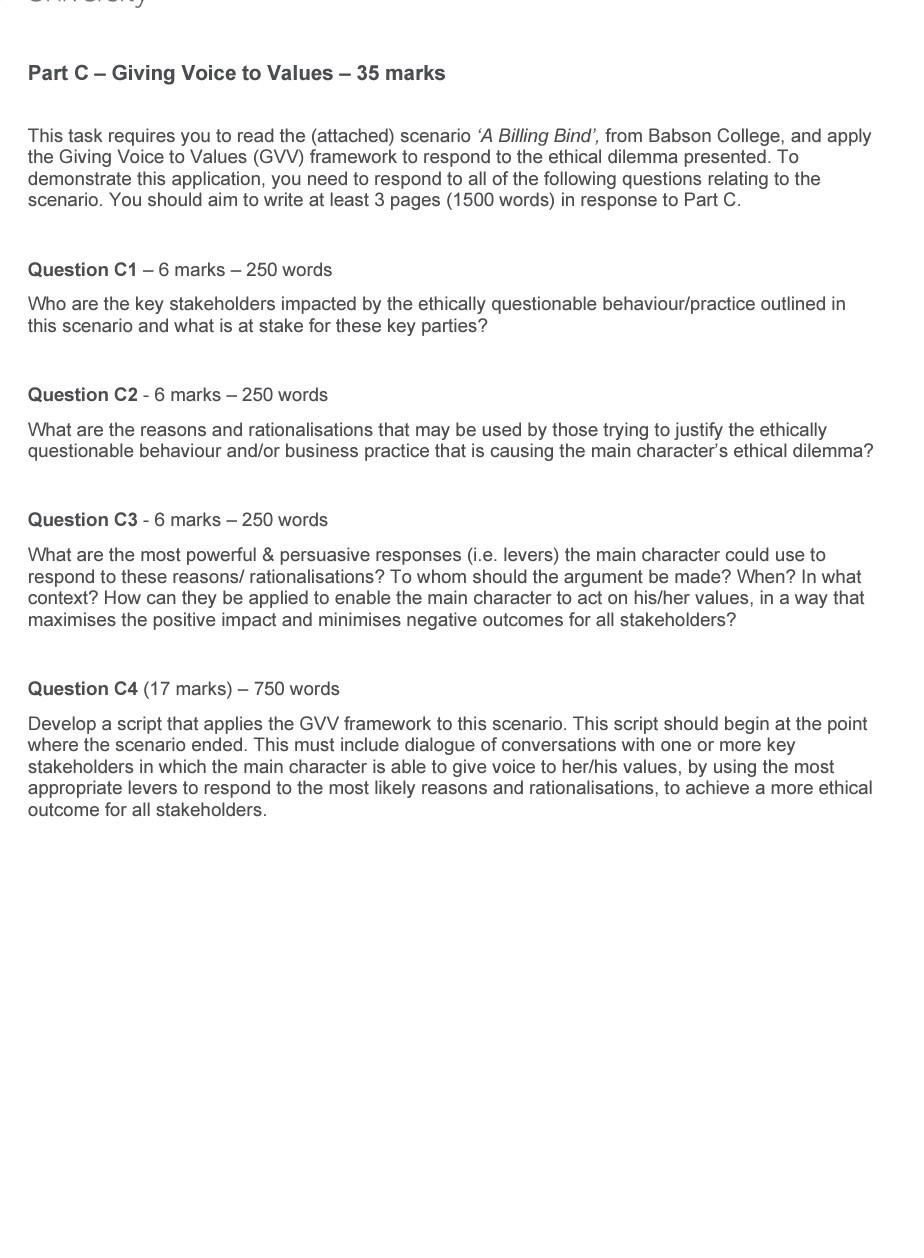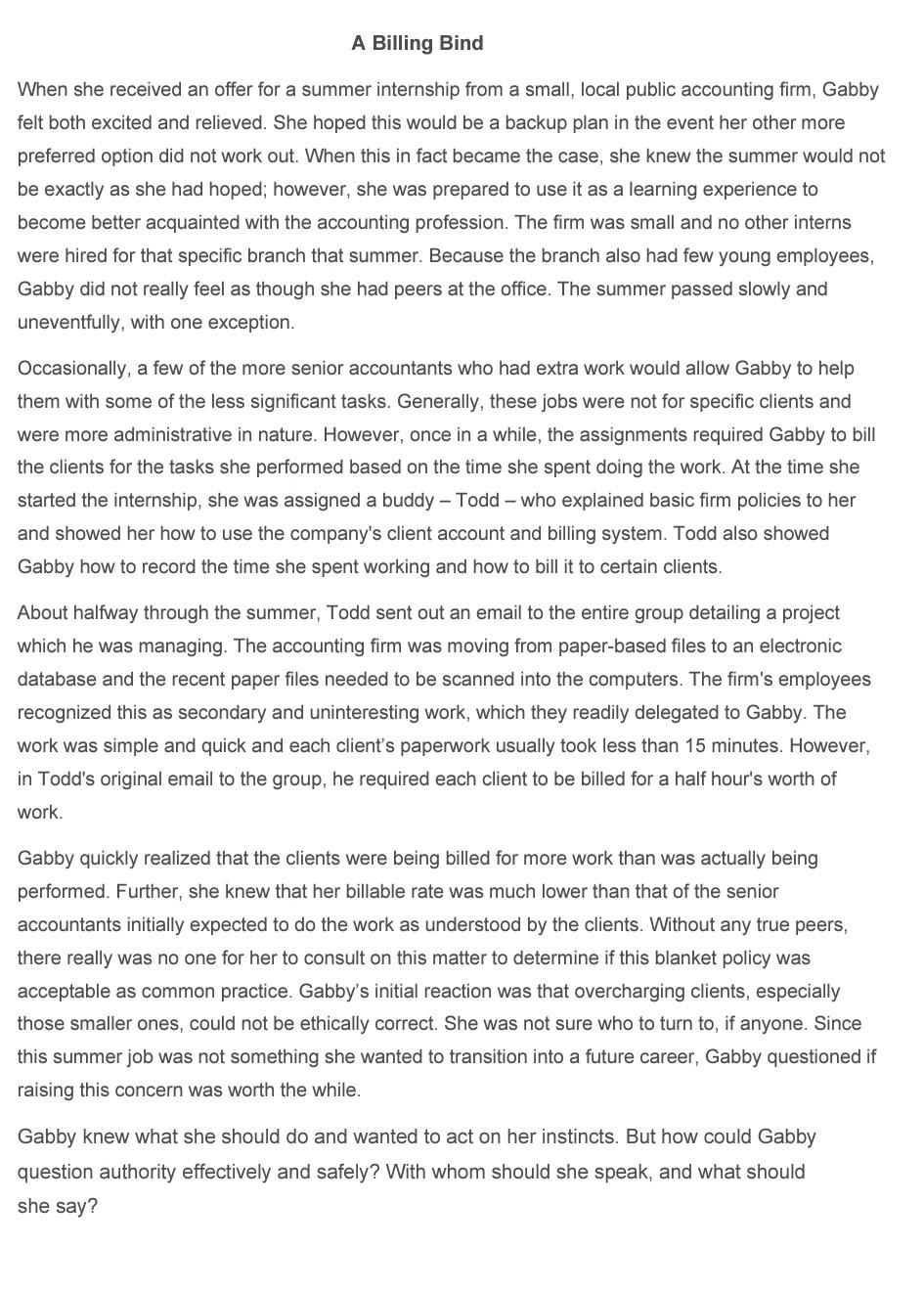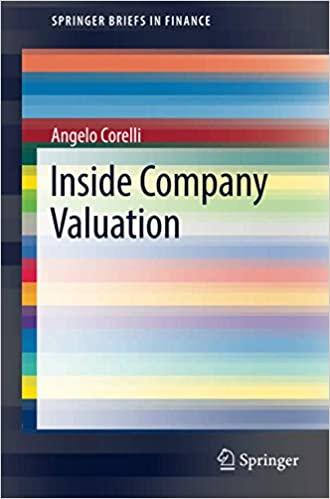Answered step by step
Verified Expert Solution
Question
1 Approved Answer
Part C-Giving Voice to Values - 35 marks This task requires you to read the attached) scenario A Billing Bind', from Babson College, and apply


Part C-Giving Voice to Values - 35 marks This task requires you to read the attached) scenario A Billing Bind', from Babson College, and apply the Giving Voice to Values (GWV) framework to respond to the ethical dilemma presented. To demonstrate this application, you need to respond to all of the following questions relating to the scenario. You should aim to write at least 3 pages (1500 words) in response to Part C. Question C1 - 6 marks -250 words Who are the key stakeholders impacted by the ethically questionable behaviour/practice outlined in this scenario and what is at stake for these key parties? Question C2 - 6 marks -250 words What are the reasons and rationalisations that may be used by those trying to justify the ethically questionable behaviour and/or business practice that is causing the main character's ethical dilemma? Question C3 - 6 marks -250 words What are the most powerful & persuasive responses (i.e. levers) the main character could use to respond to these reasons/ rationalisations? To whom should the argument be made? When? In what context? How can they be applied to enable the main character to act on his/her values, in a way that maximises the positive impact and minimises negative outcomes for all stakeholders? Question C4 (17 marks) - 750 words Develop a script that applies the GVV framework to this scenario. This script should begin at the point where the scenario ended. This must include dialogue of conversations with one or more key stakeholders in which the main character is able to give voice to her/his values, by using the most appropriate levers to respond to the most likely reasons and rationalisations, to achieve a more ethical outcome for all stakeholders. A Billing Bind When she received an offer for a summer internship from a small, local public accounting firm, Gabby felt both excited and relieved. She hoped this would be a backup plan in the event her other more preferred option did not work out. When this in fact became the case, she knew the summer would not be exactly as she had hoped; however, she was prepared to use it as a learning experience to become better acquainted with the accounting profession. The firm was small and no other interns were hired for that specific branch that summer. Because the branch also had few young employees, Gabby did not really feel as though she had peers at the office. The summer passed slowly and uneventfully, with one exception. Occasionally, a few of the more senior accountants who had extra work would allow Gabby to help them with some of the less significant tasks. Generally, these jobs were not for specific clients and were more administrative in nature. However, once in a while, the assignments required Gabby to bill the clients for the tasks she performed based on the time she spent doing the work. At the time she started the internship, she was assigned a buddy - Todd - who explained basic firm policies to her and showed her how to use the company's client account and billing system. Todd also showed Gabby how to record the time she spent working and how to bill it to certain clients. About halfway through the summer, Todd sent out an email to the entire group detailing a project which he was managing. The accounting firm was moving from paper-based files to an electronic database and the recent paper files needed to be scanned into the computers. The firm's employees recognized this as secondary and uninteresting work, which they readily delegated to Gabby. The work was simple and quick and each client's paperwork usually took less than 15 minutes. However, in Todd's original email to the group, he required each client to be billed for a half hour's worth of work. Gabby quickly realized that the clients were being billed for more work than was actually being performed. Further, she knew that her billable rate was much lower than that of the senior accountants initially expected to do the work as understood by the clients. Without any true peers, there really was no one for her to consult on this matter to determine if this blanket policy was acceptable as common practice. Gabby's initial reaction was that overcharging clients, especially those smaller ones, could not be ethically correct. She was not sure who to turn to, if anyone. Since this summer job was not something she wanted to transition into a future career, Gabby questioned if raising this concern was worth the while. Gabby knew what she should do and wanted to act on her instincts. But how could Gabby question authority effectively and safely? With whom should she speak, and what should she say? Part C-Giving Voice to Values - 35 marks This task requires you to read the attached) scenario A Billing Bind', from Babson College, and apply the Giving Voice to Values (GWV) framework to respond to the ethical dilemma presented. To demonstrate this application, you need to respond to all of the following questions relating to the scenario. You should aim to write at least 3 pages (1500 words) in response to Part C. Question C1 - 6 marks -250 words Who are the key stakeholders impacted by the ethically questionable behaviour/practice outlined in this scenario and what is at stake for these key parties? Question C2 - 6 marks -250 words What are the reasons and rationalisations that may be used by those trying to justify the ethically questionable behaviour and/or business practice that is causing the main character's ethical dilemma? Question C3 - 6 marks -250 words What are the most powerful & persuasive responses (i.e. levers) the main character could use to respond to these reasons/ rationalisations? To whom should the argument be made? When? In what context? How can they be applied to enable the main character to act on his/her values, in a way that maximises the positive impact and minimises negative outcomes for all stakeholders? Question C4 (17 marks) - 750 words Develop a script that applies the GVV framework to this scenario. This script should begin at the point where the scenario ended. This must include dialogue of conversations with one or more key stakeholders in which the main character is able to give voice to her/his values, by using the most appropriate levers to respond to the most likely reasons and rationalisations, to achieve a more ethical outcome for all stakeholders. A Billing Bind When she received an offer for a summer internship from a small, local public accounting firm, Gabby felt both excited and relieved. She hoped this would be a backup plan in the event her other more preferred option did not work out. When this in fact became the case, she knew the summer would not be exactly as she had hoped; however, she was prepared to use it as a learning experience to become better acquainted with the accounting profession. The firm was small and no other interns were hired for that specific branch that summer. Because the branch also had few young employees, Gabby did not really feel as though she had peers at the office. The summer passed slowly and uneventfully, with one exception. Occasionally, a few of the more senior accountants who had extra work would allow Gabby to help them with some of the less significant tasks. Generally, these jobs were not for specific clients and were more administrative in nature. However, once in a while, the assignments required Gabby to bill the clients for the tasks she performed based on the time she spent doing the work. At the time she started the internship, she was assigned a buddy - Todd - who explained basic firm policies to her and showed her how to use the company's client account and billing system. Todd also showed Gabby how to record the time she spent working and how to bill it to certain clients. About halfway through the summer, Todd sent out an email to the entire group detailing a project which he was managing. The accounting firm was moving from paper-based files to an electronic database and the recent paper files needed to be scanned into the computers. The firm's employees recognized this as secondary and uninteresting work, which they readily delegated to Gabby. The work was simple and quick and each client's paperwork usually took less than 15 minutes. However, in Todd's original email to the group, he required each client to be billed for a half hour's worth of work. Gabby quickly realized that the clients were being billed for more work than was actually being performed. Further, she knew that her billable rate was much lower than that of the senior accountants initially expected to do the work as understood by the clients. Without any true peers, there really was no one for her to consult on this matter to determine if this blanket policy was acceptable as common practice. Gabby's initial reaction was that overcharging clients, especially those smaller ones, could not be ethically correct. She was not sure who to turn to, if anyone. Since this summer job was not something she wanted to transition into a future career, Gabby questioned if raising this concern was worth the while. Gabby knew what she should do and wanted to act on her instincts. But how could Gabby question authority effectively and safely? With whom should she speak, and what should she say
Step by Step Solution
There are 3 Steps involved in it
Step: 1

Get Instant Access to Expert-Tailored Solutions
See step-by-step solutions with expert insights and AI powered tools for academic success
Step: 2

Step: 3

Ace Your Homework with AI
Get the answers you need in no time with our AI-driven, step-by-step assistance
Get Started


